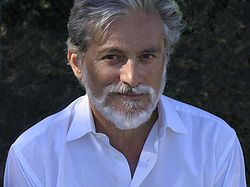
Roberto Pazzi
Encyclopedia

) is an award winning Italian novelist and poet. His works have been translated into eighteen languages.
Roberto Pazzi, lives in Ferrara, where he teaches at the university and holds annual creative writing courses, are quite active lecturer in the various countries of the world where his work has spread.
He graduated in classics in Bologna with a thesis on Luciano Anceschi and aesthetics on the poetry of Umberto Saba), taught in high school and in college 'Ferrara cultural anthropology and philosophy of history and sociology of art and literature Urbino.
Translated into twenty-six languages (English, French, German, Spanish, Catalan, Portuguese, Brazilian, Finnish, Danish, Dutch, Czech, Russian, Romanian, Slovenian, Japanese, Arabic, turkish, greek, Estonian, Lithuanian, Polish, Slovak, Croatian , Serbian, Bulgarian, Albanian and Korean) began in a poetry anthology and poetry appeared in the magazine Art in 1970, pref by Vittorio Sereni.
His collections of verse are: Prior experience (I odd, 1973), Western Verse (Rebellato 1976), The King, the words (Lacaita, 1980), Quiet air (Garzanti, international award 1987 E. Montale, translated in French in Editions de la Difference), the thread of lies (Corbo, 1994), The gravity of bodies (Palomar, 1998, translated into German and turkish Tropen by Estetik Us Premium, Frascati, Calliope Award, an award Marineo) and Talisman (Marietti 2003).
The narrative is his debut in 1985 with Looking for the Emperor, by John aforesaid Raboni (Marietti 1985, Garzanti 1988, 1997 Tea, Marietti 2004, Bergamo Prize, an award Hemingway, Selected Campiello Prize 1985, translated into twelve languages), "History of a Russian regiment lost in Siberia during the Russian Revolution, in search of the Emperor, "by the critics unanimously placed on-line great visionary of our narrative, the least popular in the twentieth century Italian. This is followed by some novels where the story becomes the pretext of fantastic reinvention on a line of thought antistoricistica: The Princess and the Dragon (Garzanti 1986, Strega Prize finalist in 1986, by Giorgio Caproni and John Raboni, Rhegium Julii Prize, an award Piombino) The disease of the time (Marietti 1987, Garzanti 1991), Gospel of Judas (Garzanti 1989, super prize Grinzane Cavour 1990, reprinted by Baldini & Castoldi in 1999, and by Sperling and Kupfer 2006), The Water Room (Garzanti 1991, Finalist Award Naples).
Cities with Dr. Malaguti (Garzanti 1993, Castiglioncello premium, premium Catanzaro), the narrative of madness, while being inspired visionary, he landed to the present, the Italian news in recent years, the town where the narrator lives, Ferrara. This is why the later novels, travel Incerti (Longanesi 1996, Campiello Prize selection, super prize Penne-Moscow 1996), Tomorrow will be king (Longanesi 1997), The flying city (Baldini & Castoldi, 1999, finalist in the Premio Strega, by Dario For and Sebastiano Vassalli, being reprinted by Frassinelli) Conclave (Frassinelli, 2001, Scanno prize, prize Comisso Flaiano super prize, prize Stresa, Zerilli Marimò prize at New York University, Nobel Rapolano Terme, Viareggio Prize finalist, finalist award Bigiaretti, translated into Germany, USA, Estonia, Slovakia, France, Spain, Portugal, Russia, Turkey, Poland, Serbia, Brazil, Croatia and in the process of translation in Japan, Lithuania, Albania and Korea), heir (Frassinelli 2002, Viareggio Prize finalist, winner Maria Cristina, translated into German), The Lord of the eyes (Frassinelli 2004, translated into Slovenian, Cala di Volpe Award), The shadow of his father (Frassinelli 2005, translated into French, Elsa Morante Prize in Procida Island ) anyone after me (Frassinelli 2007), Scissors, Solingen (Corbo 2007), After the spring (Frassinelli, 2008), and the recent "I'm sorry to see you die for no more" (Corbo 2010).
Today, after twelve years of exclusive partnership with Corriere della Sera, Italy writes in the cultural pages of several Italian newspapers including Il Resto del Carlino, La Nazione and Il Giorno and abroad for The New York Times [1].
Awards
- Selezione Campiello Prize (1985)
- Bergamo Prize (1985)
- Hemingway Prize (1985)
- Maria Cristina Prize (1986)
- Lerici Pea Prize (1986)
- Piombino Prize (1986)
- Eugenio Montale Prize (1987)
- Rhegium Julii Prize 1987
- Super Grinzane Cavour Prize (1990)
- Castiglioncello Prize (1993)
- Del tascabile Prize (1994)
- Valsassina Prize (1994)
- Selezione Campiello Prize (1996)
- Penne Prize (1996)
- Calliope Prize (1998)
- Frascati Prize (1998)
- Miscia Lanciano Prize (2000)
- Zerilli-Marimò Prize for Italian FictionZerilli-Marimò Prize for Italian FictionThe Zerilli-Marimò Prize for Italian Fiction is an Italian American literary award funded by Baroness Mariuccia Zerilli-Marimò. The award winning book is selected as being especially worthy of the attention of readers in North America and the English-speaking world...
(2001) for Conclave - Flaiano PrizeFlaiano PrizeThe Flaiano Prize , is an Italian international award recognizing achievement in the fields of theater, cinema, television, and literature...
(2001) - Scanno Prize (2001)
- Comisso Prize (2001)
- Stresa Prize 2001
- Rapolano Terme Prize (2001)
- Maria Cristina Prize (2004)
- Recanati Prize (2006)
- Procida Elsa Morante Prize (2006)
- Scalea Prize (2007)
- Bigiaretti Prize (2007)
- Giorgio La Pira Prize (2008)

